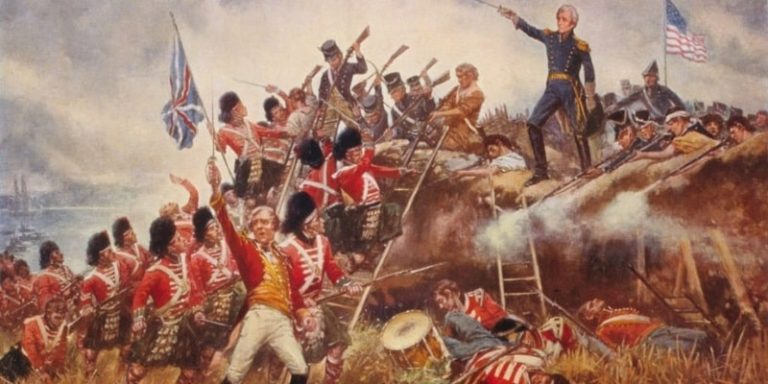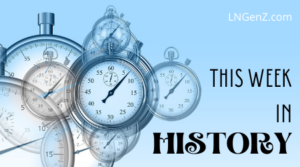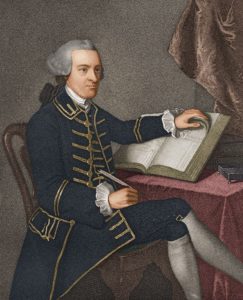This Week in History: January 8 – 14
What is so significant about the Battle of New Orleans?
By: Kelli Ballard | January 8, 2023 | 1031 Words

The Battle of New Orleans (Photo by Pierce Archive LLC/Buyenlarge via Getty Images)
“There runs a strange law through the length of human history – that men are continually tending to undervalue their environment, to undervalue their happiness, to undervalue themselves.” ~ G.K. Chesterton
January 8, 1815: The Battle of New Orleans
It was during the War of 1812 that the infamous Battle of New Orleans took place. The British thought they had a good chance of taking the city, which would have given them control over the Mississippi River and trade. Even though the Colonists had managed to hold them off at the Battle of Baltimore (which was where Francis Scott Key was inspired to write the Star-Spangled Banner) and the Battle of Plattsburgh, the British still pressed onward.
Future President Andrew Jackson, known as “Old Hickory,” was no fan of the British since he had been a prisoner of war with them during the Revolutionary War. When he heard the English were planning an attack at New Orleans, he quickly set out to stop them, telling his wife, “I owe to Britain a debt of retaliatory vengeance, should our forces meet I trust I shall pay the debt.”
Although the British forces were nearly double the Americans’, they were no match for the defensive “Line Jackson” – a trench with a seven-foot-tall rampart that stretched nearly a mile. The Battle of New Orleans was soon over, and the Americans rejoiced in victory. James Monroe, who would also become president later, said, “History records no example of so glorious a victory obtained with so little bloodshed on the part of the victorious.”
The Significance of the Battle
Jackson returned to New Orleans with a lot of fanfare and people singing “Yankee Doodle.” Newspapers called him the national savior. This popularity led to him being elected the seventh president of the US.
However, one of the most significant issues of the battle was that no one knew the War of 1812 had already ended two weeks earlier when Great Britain and America signed the Treaty of Ghent. In those times, news traveled slow, so the warring troops had no idea that they had no reason to fight.
Other Notable History Mentions
January 8, 1918: During World War I, President Woodrow Wilson suggested his Fourteen Points which would create a League of Nations and called for a reduction of arms as well as self-determination of governments.
January 8, 1964: President Lyndon Johnson, during his State of the Union message, declared War on Poverty.
January 8, 1982: Because of an antitrust suit, The American Telephone Telegraph Company (AT&T) was broken up and had to give up 22 local Bell system companies. As a result, the telephone system was open to competition.
January 8, 1987: For the first time, the Dow Jones industrial average topped the 2,000 mark.
January 9, 1960: Construction began on the Aswan High Dam across the Nile River in Egypt. The dam created Lake Nasser, which is one of the world’s largest reservoirs.
January 10, 1776: Thomas Paine’s 50-page pamphlet Common Sense was published. It sold more than 500,000 copies and influenced authors, including some of the Declaration of Independence.
January 10, 1861: Just before the Civil War began, Florida became the third state to secede from the Union.
 January 10, 1863: In London, the world’s first underground railway service opened. It provided the line between Paddington and Farringdon.
January 10, 1863: In London, the world’s first underground railway service opened. It provided the line between Paddington and Farringdon.
January 10, 1878: Senator A.A. Sargent of California introduced an amendment to grant women the right to vote. It didn’t pass until 42 years later, in 1920.
January 10, 1912: Glen Curtiss’ flying boat airplane made its first flight in New York.
January 10, 1920: The League of Nations was formed. The first assembly had 41 nations represented and 20 others followed soon after. The US, however, didn’t join because there wasn’t support from Congress.
January 10, 1946: The first meeting of the United Nations General Assembly (UN) was held in London. The UN replaced the League of Nations.
January 11, 1861: Like Florida, Alabama seceded from the Union as the Civil War was heating up.
January 11, 1964: The US Surgeon General warned that cigarettes may be harmful to health. This was the first time an official government report suggested smoking may be hazardous.
January 12, 1991: President George Bush was authorized by Congress to use military force against Iraq after the country invaded Kuwait.
January 13, 1893: The British Independent Labor Party was founded.
January 14-23, 1943: President Franklin Roosevelt and British Prime Minister Winston Churchill met to work on a strategy during World War II. They held a joint news conference and Roosevelt said that peace would happen “by the total elimination of German and Japanese war power. That means the unconditional surrender of Germany, Italy and Japan.”
Famous Birthdays
Elvis Presley (January 8, 1935) was born in Tupelo, Mississippi. Known to some as the King of Rock ‘n’ Roll, he is still an icon to many musicians and fans.
Richard Nixon (January 9, 1913) was born in Yorba Linda, California. He was the 37th president and the only commander-in-chief to resign.

John Hancock (Photo by Stock Montage/Getty Images)
Carrie Lane Chapman (January 9, 1859) was born in Ripon, Wisconsin. A women’s right activist, in 1919 she founded the National League of Women Voters.
Alexander Hamilton (January 11, 1755) was born in the British West Indies. He is considered one of the Founding Fathers and is know for co-authoring the Federalist Papers.
John Winthrop (January 12, 1588) was born in Suffolk, England. He joined a group of Puritans traveling to America and became the first governor of Massachusetts Bay colony. The colony he established later became Boston.
Edmund Burke (January 12, 1729) was born in Dublin, Ireland. A politician and philosopher, he is known for his essays including On American Taxation, Reflections on the Revolution in France, and On Conciliation with the Colonies.
John Hancock (January 12, 1737) was born in Braintree, Massachusetts. He was president of the Second Continental Congress and the first signer of the Declaration of Independence.
Horatio Alger (January 13, 1834) was born in Revere, Massachusetts. An author, he wrote books for boys with a “rags to riches” theme.
Benedict Arnold (January 14, 1741) was born in Norwich, Connecticut. A hero during the American Revolutionary War, he became a traitor by sending information to the British.
Hal Roach (January 14, 1892) was born in Elmira, New York. A film pioneer, he produced more than 1,000 movies as well as the Laurel and Hardy comedies.
















